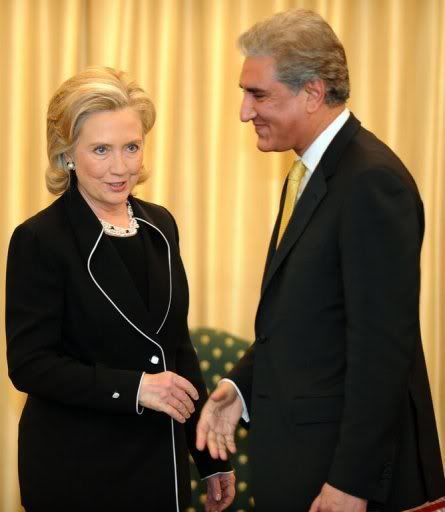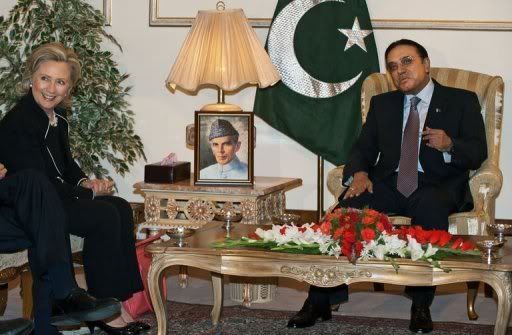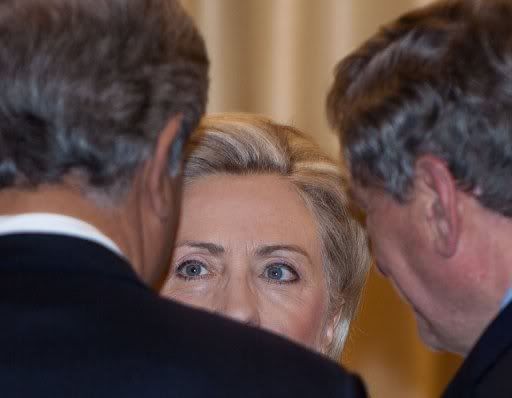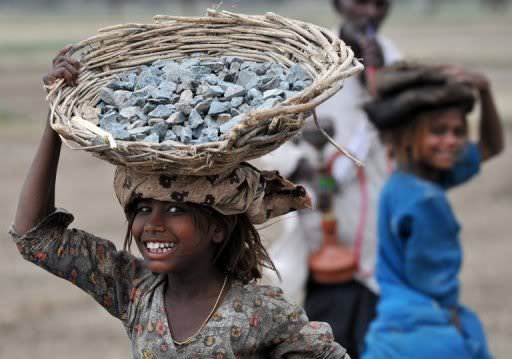
Clinton (L) confirmed that US planned to formally designate Pakistan's Haqqani network a foreign terrorist organisation
U.S. Secretary of State Hillary Rodham Clinton on Tuesday vowed the United States and its allies will stand by Afghanistan even as fears are growing about the course of the nearly 9-year-old war and the Obama administration plans to begin withdrawing American troops from the country next year.

Clinton (L) called for "additional measures" by Pakistan to combat militant groups on its soil

Clinton (C) arrived in Islamabad Sunday en route to a donor conference in Kabul

The aid focused on water and energy needs of Pakistan
Clinton acknowledged deepening opposition to international involvement in the conflict amid the rising death toll of foreign troops in the country. But she told an international conference on Afghanistan's future that the "world is with Afghanistan" and that the planned drawdown of U.S. forces was not a sign of flagging commitment.
"The July 2011 date captures both our sense of urgency and the strength of our resolve," she said of U.S. plans to accelerate the process of turning over security to Afghanistan's police and military. "The transition process is too important to push off indefinitely."
"But this date is the start of a new phase, not the end of our involvement," Clinton told the conference, which is being attended by senior officials from about 70 countries. "We have no intention of abandoning our long-term mission of achieving a stable, secure, peaceful Afghanistan."
Mounting concerns about the war and rampant corruption in Afghan President Hamid Karzai's government have prompted many in the U.S. and allied countries to raise serious questions about the wisdom of carrying on the fight.
Clinton allowed that "the road ahead will not be easy," particularly given those concerns, which could threaten funding for military operations.
"Citizens of many nations represented here, including my own, wonder whether success is even possible — and if so, whether we all have the commitment to achieve it. We will answer these questions with our actions," she said, pledging to step up U.S. civilian assistance to help rehabilitate and reconstruct the war-shattered nation.
US Secretary of State Hillary Clinton on Monday announced major aid projects for Pakistan as she sought tougher action from Islamabad to combat militants ahead of a key donor meeting in Afghanistan.
Clinton is bidding to build on a shaky alliance with Pakistan, whose mountainous western border shields Taliban militants fighting the insurgency next door, as well as groups responsible for attacks in the United States.
The aid focused on water and energy needs of Pakistan is part of US efforts to deepen engagement with the Asian nuclear power and overcome rife anti-Americanism after years of perceived neglect of bilateral relations.
Washington believes Pakistan is integral to any result in the Afghan war and has long voiced concern that Pakistan's powerbrokers were supporting Taliban insurgents, despite crackdowns by the military in some border areas.
Clinton met Pakistan's prime minister and president on Sunday and in a media interview acknowledged greater joint efforts on terrorism, but called for "additional measures" from Islamabad to combat militants on its soil.
"There are still additional steps that we are asking and expecting the Pakistanis to take," she told the BBC.
"... there is no doubt in anyone?s mind that should an attack against the United States be traced to be Pakistani it would have a very devastating impact on our relationship," she added.
A Pakistani-American arrested over the botched car bombing in New York's Times Square in May allegedly received explosives training from experts linked to the Pakistani militant group the Tehrik-e-Taliban.
The group operates from the tribal zones of Pakistan, considered by Washington to be the global headquarters of the Pakistani Taliban and their allies in Al-Qaeda, as well as a base camp for the Afghan Taliban.
Clinton confirmed that Washington planned to formally designate Pakistan's Haqqani network a foreign terrorist organisation.
The network, which is battling coalition troops in Afghanistan and is thought to have close links with Pakistan's intelligence services, is one of the toughest foes faced by foreign forces in Afghanistan.
A senior US official speaking on condition of anonymity said closer ties with Pakistan's powerful army chief General Ashfaq Kayani were helping in the struggle against the militant Haqqani network.
"The amount of engagement we have with General Kayani... is unprecedented. We feel that we're making some slow but steady forward movement (on Haqqani)," the official said.
Clinton was due to meet Kayani for closed-door discussions later Monday before travelling to Kabul for a key international conference focused on charting a course for the war-torn country's future involving less dependency on its Western backers.
Pakistan and the United States had been allies throughout the Cold War years as both played a key role in arming Islamist insurgents who ousted Soviet troops from Afghanistan in 1989.
Ties then cooled until the September 11, 2001 attacks on the United States.
On Monday, Clinton hailed progress in relations.
"We have moved beyond a stand-off where we are engaged in a most important dialogue... I'm pleased and impressed to see the leadership of Pakistan tackling some hard problems," she said.
Pakistan has been hard hit by Taliban and Al-Qaeda-linked violence, with attacks killing more than 3,500 people across the country since government troops besieged a radical mosque in Islamabad in July 2007.
A suicide bomber blew himself up at a mosque in the eastern city of Sargodha Sunday evening, wounding at least 12 people, officials said.
Opening Monday talks with Foreign Minister Shah Mehmood Qureshi, Clinton said she hoped the aid projects would "lay the foundations for an enduring partnership" with Pakistan.
They include two energy dams, various drinking water and irrigation projects, as well as the building of health centres and schemes to improve agriculture and private sector income.
They are part of a five-year 7.5-billion-dollar funding approved by the US Congress last year.
Clinton also lauded a new transit trade deal signed between Afghanistan and Pakistan on Sunday that officials said could boost cross-border trade from an annual 1.5 billion dollars to five billion.








0 comments:
Post a Comment